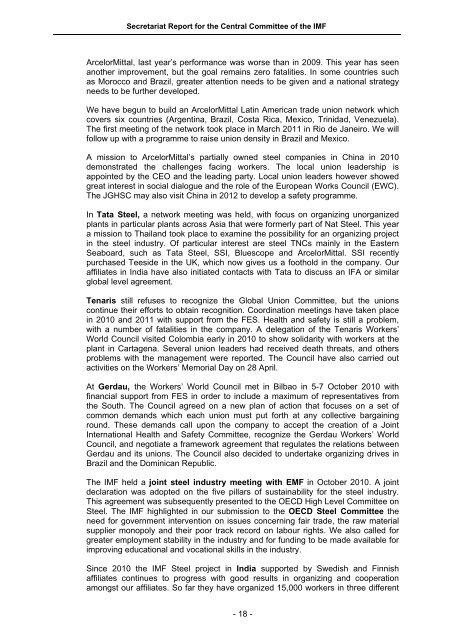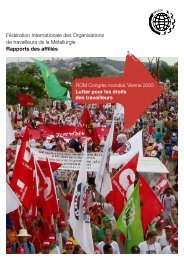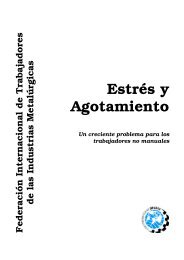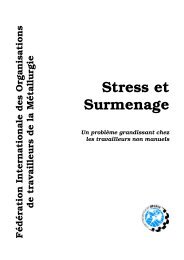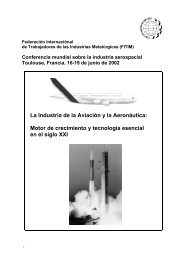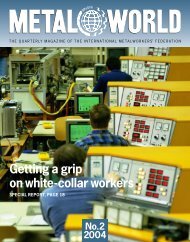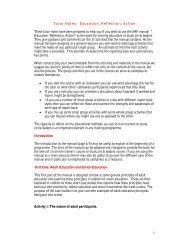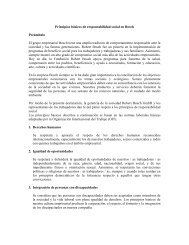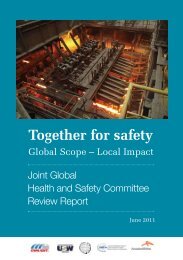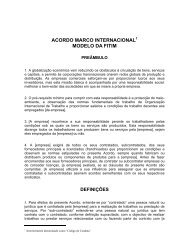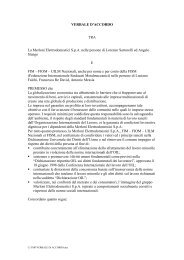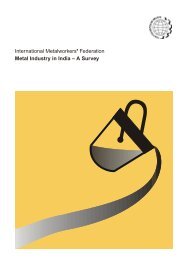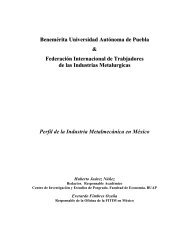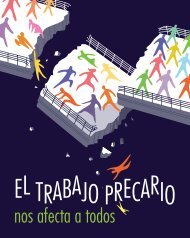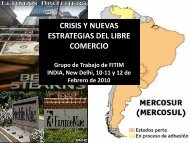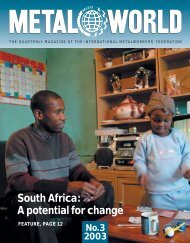Secretariat Report 2011 (pdf) - International Metalworkers' Federation
Secretariat Report 2011 (pdf) - International Metalworkers' Federation
Secretariat Report 2011 (pdf) - International Metalworkers' Federation
Create successful ePaper yourself
Turn your PDF publications into a flip-book with our unique Google optimized e-Paper software.
<strong>Secretariat</strong> <strong>Report</strong> for the Central Committee of the IMF<br />
ArcelorMittal, last year’s performance was worse than in 2009. This year has seen<br />
another improvement, but the goal remains zero fatalities. In some countries such<br />
as Morocco and Brazil, greater attention needs to be given and a national strategy<br />
needs to be further developed.<br />
We have begun to build an ArcelorMittal Latin American trade union network which<br />
covers six countries (Argentina, Brazil, Costa Rica, Mexico, Trinidad, Venezuela).<br />
The first meeting of the network took place in March <strong>2011</strong> in Rio de Janeiro. We will<br />
follow up with a programme to raise union density in Brazil and Mexico.<br />
A mission to ArcelorMittal’s partially owned steel companies in China in 2010<br />
demonstrated the challenges facing workers. The local union leadership is<br />
appointed by the CEO and the leading party. Local union leaders however showed<br />
great interest in social dialogue and the role of the European Works Council (EWC).<br />
The JGHSC may also visit China in 2012 to develop a safety programme.<br />
In Tata Steel, a network meeting was held, with focus on organizing unorganized<br />
plants in particular plants across Asia that were formerly part of Nat Steel. This year<br />
a mission to Thailand took place to examine the possibility for an organizing project<br />
in the steel industry. Of particular interest are steel TNCs mainly in the Eastern<br />
Seaboard, such as Tata Steel, SSI, Bluescope and ArcelorMittal. SSI recently<br />
purchased Teeside in the UK, which now gives us a foothold in the company. Our<br />
affiliates in India have also initiated contacts with Tata to discuss an IFA or similar<br />
global level agreement.<br />
Tenaris still refuses to recognize the Global Union Committee, but the unions<br />
continue their efforts to obtain recognition. Coordination meetings have taken place<br />
in 2010 and <strong>2011</strong> with support from the FES. Health and safety is still a problem,<br />
with a number of fatalities in the company. A delegation of the Tenaris Workers’<br />
World Council visited Colombia early in 2010 to show solidarity with workers at the<br />
plant in Cartagena. Several union leaders had received death threats, and others<br />
problems with the management were reported. The Council have also carried out<br />
activities on the Workers’ Memorial Day on 28 April.<br />
At Gerdau, the Workers’ World Council met in Bilbao in 5-7 October 2010 with<br />
financial support from FES in order to include a maximum of representatives from<br />
the South. The Council agreed on a new plan of action that focuses on a set of<br />
common demands which each union must put forth at any collective bargaining<br />
round. These demands call upon the company to accept the creation of a Joint<br />
<strong>International</strong> Health and Safety Committee, recognize the Gerdau Workers’ World<br />
Council, and negotiate a framework agreement that regulates the relations between<br />
Gerdau and its unions. The Council also decided to undertake organizing drives in<br />
Brazil and the Dominican Republic.<br />
The IMF held a joint steel industry meeting with EMF in October 2010. A joint<br />
declaration was adopted on the five pillars of sustainability for the steel industry.<br />
This agreement was subsequently presented to the OECD High Level Committee on<br />
Steel. The IMF highlighted in our submission to the OECD Steel Committee the<br />
need for government intervention on issues concerning fair trade, the raw material<br />
supplier monopoly and their poor track record on labour rights. We also called for<br />
greater employment stability in the industry and for funding to be made available for<br />
improving educational and vocational skills in the industry.<br />
Since 2010 the IMF Steel project in India supported by Swedish and Finnish<br />
affiliates continues to progress with good results in organizing and cooperation<br />
amongst our affiliates. So far they have organized 15,000 workers in three different<br />
- 18 -


